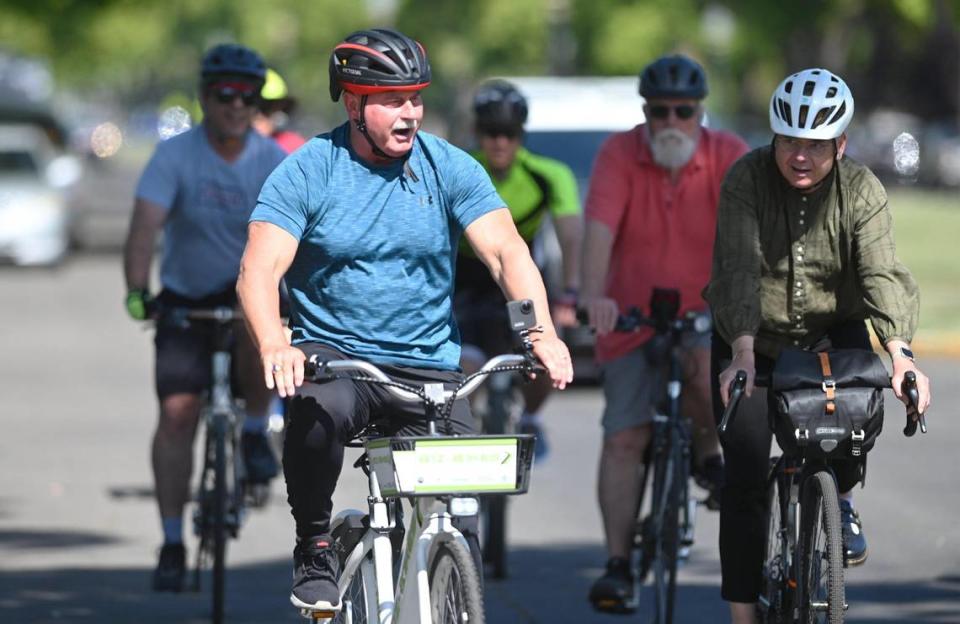How city leaders’ trip to Münster could make Fresno a safer place to bike | Opinion
- Oops!Something went wrong.Please try again later.
Mayor Jerry Dyer and two council members learned something important during their August visit to Münster, Germany, one of Fresno’s sister cities.
Cars aren’t the only way to live.
Münster, a city of 320,000 spread over a larger area than Fresno, is recognized as one of the world’s most bicycle-friendly burgs. Even though 47% of the population rides bikes on a daily basis, cycling fatalities are rare.
Compare that to Fresno, where about 1% bikes each day and still 11 cyclists have been killed since January 2022. (That’s out of 255 total collisions involving bikes during that span, according to figures reported by Fresno police.)
Opinion
The difference is one city was designed for automobiles, the other for people.
Münster boasts an integrated network of bike paths — more than 2,750 miles of them in the city and surrounding region — leading from residents’ homes to where they work, study, shop and socialize.
Fresno has a mish-mash of cycling infrastructure and a completely different transportation mindset. Nearly everyone who can afford to drive does, and for every errand regardless of distance. No matter the negative impact on our air quality.
But cars aren’t the only way to live. Which is something Dyer and Fresno City Councilmembers Luis Chavez and Mike Karbassi witnessed first hand, and perhaps for the first time, during their visit to Münster.
“I think they saw how active transportation can be integrated into everyday life – how it’s possible to live like that,” said Laura Gromis, a native German who chairs the city’s Active Transportation Advisory Committee and was among the delegation.
“I think before, for some of them, they could not really envision that until they saw it for themselves. It helped them develop a vision of what it can look like and something to work toward.”

City leaders take 5½-mile spin
Dyer, Chavez and Karbassi took part Wednesday in the second-annual “Ride With the Mayor” organized by local cycling advocates for National Bike Month. Starting from City Hall, the wheeled procession pedaled a 5½-mile loop from downtown to the Tower District and back via the protected bike lanes on Van Ness and Wishon avenues.
The idea was to give city leaders a taste of what it’s like to bike through Fresno on a 91-degree afternoon, albeit with a cadre of bike cops that held up traffic at intersections, while highlighting recent additions to the city’s cycling infrastructure.
It also gave Dyer, Chavez and Karbassi the chance to reminisce about their trip to Münster and the foreign transportation culture to which they were introduced. Dyer and Karbassi remain in awe over the sheer number of people riding bikes, while Chavez marveled at the size of a bike storage facility attached to the train station.
“The thing was massive!” Chavez exclaimed while riding on Fulton Street.
During meetings between the two delegations, elected officials and city staff from Münster frequently arrived by bike. This was completely normal. Fresno leaders also got to witness their genuine enthusiasm for cycling culture and how they worked with officials from neighboring cities on regional projects, even one across the border in The Netherlands.
“They saw that active transportation is an international movement and something that makes people happy and brings them together,” said Gromis, executive director of the U.S. Green Building Council local chapter.
“Coming from a car-centric city like Fresno, I think it really opened their eyes. You have to be able to imagine what’s possible in order to be able to work toward that goal.”
Fresno’s immediate goals include an update of the Active Transportation Plan and completing the city’s first Vision Zero Plan, a blueprint for eliminating preventable cyclist and pedestrian fatalities. The Midtown Trail continues to make slow progress, and more protected bike lanes are coming. (The next ones could be on Blackstone Avenue between Dakota Avenue and the 180 freeway overpass, provided Dyer’s proposed budget gets adopted.)
No one, not even the most demanding and optimistic cycling advocate, expects Fresno to catch up to Münster anytime soon. Culture change requires a generation.
Even in the bike capital of Germany, residents were initially resistant to building cycling paths and restricting cars from certain streets. Now it’s ingrained.
“It didn’t happen overnight there, either,” Karbassi noted. “But their model shows us what is possible, and I want to be part of laying that groundwork.”
And you thought all Fresno officials did in Germany was drink lager and eat schnitzel.

